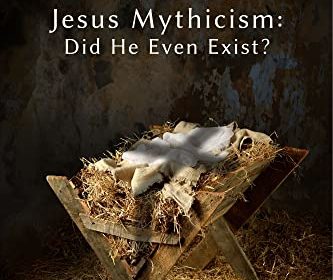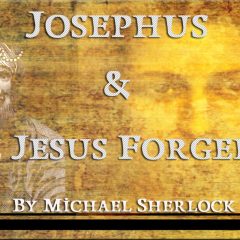How to Successfully Argue Jesus Existed (by Richard Carrier)
In conjunction with my Critical Thinking course this month, and in light of a number of casual debates I’ve been in lately, I’ve drawn up this twelve step advice, which actually applies to all arguments for any conclusions in any subject whatever. But I’ll use defending the historicity of Jesus as the key example. The first rule is pretty obvious… By Dr. Richard Carrier 1. Tell the truth. I wish I didn’t have to say that. But it’s apparently necessary to put this front and center, as the most important step. Don’t make things up. Don’t make claims you haven’t checked are true. Don’t make false statements about what any opponent has or hasn’t argued. The truth should not have to be defended with lies. That you are lying, calls into question the truth of what you are defending. And your motives for defending it. And yet this has happened repeatedly in the historicity debate. Actual sitting professors have lied about the evidence and lied about their mistakes in addressing the evidence (examples include Bart Ehrman, e.g. this lie and this lieand this lie, and James McGrath, e.g. this lie, and all these lies). Amateurs and Christian apologists are even more prone to doing this. Which also means, you need to be on your guard against this. Sadly, you can’t even trust high-profile professors these days. Fact-check everyone. 2. Consensus is a weak argument. If a peer reviewed study challenges the consensus, citing the consensus against it is literally a fallacy of circular argument. You need to explain why the consensus is correct and the challenge not sufficient to overturn it. “That it’s the consensus” does not answer that. And yet answering that is difficult in a field awash with strong religious biases and no coherent methodology for adjudicating what’s true. False analogies, like Holocaust and Global Warming and Evolution denial, only make you look dishonest, or totally ignorant of the actual problem in the case of Jesus, for whom nowhere remotely near as much evidence exists as exists for those other things. But more importantly, for all of those things, we can explain why the consensus is right and the challenge to it wrong. And it is only because we can do that, that “it’s the consensus” works as an argument in those cases. So it won’t work in any other case, if you can’t do that. So do it. A more apt analogy is Moses and the Patriarchs: consensus once held they existed; the mainstream consensus now, is that they didn’t, or that their existence is sufficiently doubtful we can’t affirm they did exist with any honest confidence. If the consensus was wrong about them, it can be...
‘Don’t take the Bible literally’ says scholar who brought to light earliest Latin analysis of the Gospels
The earliest Latin interpretation of the Gospels has been brought to light by a British academic – and it suggests that readers should not take the Bible literally. Lost for 1,500 years, the fourth-century commentary by African-born Italian bishop Fortunatianus of Aquileia interprets the Gospels as a series of allegories instead of a literal history. By Olivia Rudgard, religious affairs correspondent Dr Hugh Houghton, of the University of Birmingham, who translated the work, said it was an approach which modern Christians could learn from. The find adds weight to the idea that many early biblical scholars did not see the Bible as a history, but instead a series of coded messages which represented key elements of Christianity, he said. “There’s been an assumption that it’s a literal record of truth – a lot of the early scholars got very worried about inconsistencies between Matthew and Luke, for example. “But for people teaching the Bible in the fourth century, it’s not the literal meaning which is important, it’s how it’s read allegorically. “In contemporary Biblical scholarship a lot of the gospels are written with symbolism in mind. “They are not setting out to be literal accounts but they are set out to be symbolic.” He said that the Bible had to be “understood in the context that the authors were working in.” The approach differs from the trend of biblical literalism adopted by modern evangelical and fundamentalist Christians, which interprets the Bible as the literal word of God which is not open to interpretation. This has been the basis for beliefs such as the idea that the earth is 6,000 years old and that it was created in seven days. Modern archaeologists have also used the Bible to search for evidence about the life of Jesus, with mixed success. The 100-page document examines the Gospel of Matthew in great detail and also examines part of the Gospels according to Luke and John. It had been hidden for 1,500 years within an anonymous manuscript in Cologne Cathedral Library, until it was digitised by the University of Salzburg in 2012, but lay untranslated until Dr Houghton came across it. He discovered the existence of the manuscript after an Austrian colleague read about it in a local newspaper and told him about it. The work is thought to have been copied out by a scholar in around 800, more than 400 years after the original was written. Dr Houghton said the book was an “extraordinary find”. It predates better-known writings by famous scholars including St Jerome, St Ambrose and St Augustine. The biblical scholar, from the university’s institute for textual scholarship and electronic editing, has...
History writer: Jesus probably never existed — here’s why Christianity emerged anyway
With Easter coming, some people are debating whether the resurrection of Jesus really happened. Others are debating whether Jesus was even real. In ten years of writing for news and opinion sites, my most popular article about religion was one titled, “Five Reasons to Suspect Jesus Never Existed.” The article emerged from a conversation with history writer David Fitzgerald and was based on his book, Nailed. Fitzgerald holds the controversial perspective that the figure of Jesus at the heart of Christianity is historicized mythology, meaning that the original kernel was a set of ancient religious tropes or myths that got historical details added as they were told and retold by people who believed them to be real. By contrast, best-selling New Testament scholar Bart Ehrman (and most secular historians and mainline Christian theologians) argue that an actual radical rabbi provided the kernel of the stories, but that accounts of his life then got overlaid with fragments of mythology drawn from Judaism and surrounding religions. In other words, they hold that the Bible stories are mythologized history. The third perspective, of course, is that held by many (though not all) Christians—that the gospel stories are gospel truth. Outsiders can debate all they want, but Christians need to believe that Jesus was real, and defenders of the faith line up a series of proofs that they claim settle the question. Now Fitzgerald has produced a three-volume set, Jesus: Mything in Action, in which he tackles those proofs one by one and then lays out how Christianity could have emerged even in the absence of a historical Jesus. Tarico: What first made you wonder if, perhaps, Jesus never existed? Fitzgerald: It’s funny; for the first thirty-five years of my life, the very idea that there might not have been a real Jesus never occurred to me. Ironically enough, it wasn’t until I became curious to know what Jesus really said and did that I began to seriously look at our evidence for Jesus. That‘s when the doubts set in. At first, I just wanted to figure out which parts of the gospels were later legendary add-ons. Over time I became increasingly convinced that Jesus himself is a completely mythical figure of the early Christians. That led me to write Nailed. Tarico: What are a couple of the key points that took you from that first wild, trippy thought—Whoa, what if Jesus never existed?—to your current position, that he probably didn’t. Fitzgerald: Honestly, I’d put it even more strongly than that – now, I actually can’t see how there even could have been an actual Jesus. The first red flag for me was realizing just how...
Couchoud’s The Creation of Christ uploaded (by Rene Salm)
I am pleased to notify readers that I have uploaded to this website the English translation of Paul-Louis Couchoud’s seminal work The Creation of Christ: An Outline of the Beginnings of Christianity (1939; original French edition: Jésus, Le Dieu fait Homme, 1937). By Rene Salm The expert translation was executed by C. Bradlaugh Bonner and is in two volumes (229 and 241 pages), each in a separate PDF. I would like to thank Frank Zindler for making the digital translation on two CDs available to me, and also for graciously allowing me to put this important work of Jesus mythicism before the general public. The two PDF’s can be downloaded at the links below and also from the onsite introductory page on P. L. Couchoud. The French mythicist Georges Ory summarized Couchoud’s view regarding Jesus: The history of Jesus is the history of the formation of Jesus. It enters the human psyche as do all divine histories, by agreement, council, and fiat. Jesus was declared a historical personage by the ardent outworkings of faith, outworkings whose traces cannot be found before the second century of our era. Jesus is a being constructed by consensus. Such constructed beings are properly termed divinities… [Jesus] was birthed by a cult, grew up with it, did not become god but was so from the start—a savior god, a heavenly king… The true historian of Jesus is not a historicist. He knows how to distinguish facts from ideas which use facts. Jesus is the source only of sterility and irritation when seen from the historicist perspective. That Jesus will reward enquirers with infinite frustration. Such, in the main, was the conception of Paul-Louis Couchoud. (G. Ory, article on Couchoud in the the Dictionnaire Rationaliste of 1964, my translation.) The Creation of Christ, vol. 1 (1.1 MB) The Creation of Christ, vol. 2 (1.7 MB) Neil Godfrey also offers the entire book in segments (scanned from the hardcopy), with his comments, beginning here. ...
Josephus & The Jesus Forgeries (by Michael Sherlock)
In Memory of D.M. Murdock Josephus was an elite Jew, born in Jerusalem a few years after Jesus’ alleged crucifixion. He served as a Jewish military leader in Galilee, the very place alleged to have been home to Jesus. Josephus’ father, Matthais, was of Jewish royalty and lived during the alleged life of Jesus, in Jerusalem, the very town in which many of Jesus’ main events were supposed to have transpired. It is curious that Josephus’ father never mentioned a miracle worker by the name of Jesus of Nazareth. Josephus was also a Jewish historian who penned voluminous works on Jewish history. Two of his most renowned works were the ‘Antiquities of the Jews’ and ‘The Jewish Wars.’ From these works it is plain to see that despite his desire for self-preservation, he was a very proud and devout Jew. Before we begin to examine the two alleged references to Jesus which appear in his work entitled ‘Antiquity of the Jews’ (90CE~94CE), it is both relevant and necessary to note that within his ‘Antiquities of the Jews,’ he made mention of approximately twenty different people named Jesus. Some of these characters included Jesus the son of Sapphias, Jesus the son of Gamala, Jesus the son of Phabet, Jesus the son of Sie, Jesus the son of Fabus, Jesus the son of Thias, Jesus the son of Gamaliel, Jesus the son of Damneus, Jesus the brother of Onias, Jesus the brother of John, Jesus the Galilean, who was a great military commander, and numerous others. Josephus – The Jew Given that we know Josephus remained a devout Jew for the entire span of his life, we should take a quick look at the Jewish belief regarding the coming messiah. Judaism, whether pharisaic or orthodox, rejects the notion that the Christian’s Jesus was the Messiah/Christ. A prominent Jewish website enunciates the Jewish belief regarding the future arrival of the messiah, saying: “Belief in the eventual coming of the ‘moshiach’ (messiah)… is part of the minimum requirements of Jewish belief. In the ‘Shemoneh Esrei’ prayer, recited three times daily, we pray for all of the elements of the coming of the moshiach: gathering of the exiles; restoration of the religious courts of justice; an end of wickedness, sin, and heresy; reward to the righteous; rebuilding of Jerusalem; restoration of the line of King David; and restoration of Temple service.”(1) Furthermore, Judaism has certain scriptural requirements for the coming messiah which have yet to be fulfilled. What is the Messiah supposed to accomplish? The Hebrew Bible says that he will: Build the Third Temple (Ezekiel 37:26-28). Gather all Jews back to the Land of Israel (Isaiah 43:5-6). Usher in...
Kenneth Humphreys’ thoughts about the 1st Panhellenic Mythicist Conference
What an honour to have been a guest speaker at the First Panhellenic Mythicist Conference, held in May 2016! This was a well-organised conference held in the prestigious Athens Cultural Centre, with a dozen excellent speakers from diverse academic and research backgrounds and speaking on a wide range of mythicist topics. The Greeks are justifiably proud of their cultural heritage of myth, one of their many gifts to civilisation, and not lost even if obscured by centuries of religious Orthodoxy. Greek Mythicists are far from being stridently anti-Christian but the contribution they are able to make in exposing the falsification of the tales of Jesus from the myths of ancient Greece is without equal. A Jewish corpse Jesus may be but he is a corpse clothed in the myths of ancient Greece. by Kenneth Humphreys, jesusneverexisted.com A public transport strike did not deter a good attendance at the conference, and the audience remained engaged for eight long hours of detailed and informed erudition. I had the services of two excellent translators. The presentations began with a consideration of ubiquitous solar myths and symbolism (profs. Stephanos Paipetis, Radamanthys Anastasakis) and the shift from the collective discovery of knowledge to the restrictive “prophetic revelation” and symbolic hero-types typical of religion. It moved through a closer consideration of the myths of Genesis and female subordination (Harita Meenee) to the emergence of the “divine mother and child” archetype (Stratos Theodosiou) and the later development of a “virgin assumed into heaven” (George Ioannidis). Discussion moved on to the subsuming of myth into the faux historicity of Christianity (Christos Panopoulos). Pre-Christian religion was shown to have profoundly influenced Christian rituals, in dance, music and voice (Ioannis Mpousiou). Antecedents to the cross were identified in Orphic archetypes (Evrinomi Gavra). Doubts as to the historicity of Jesus were expressed very early by Neoplatonists (George Gousgounis). In my own talk, I presented the worldwide dimension to Jesus mythicism and a broad-brush introduction to mythicist arguments – expertly rendered into Greek by Marietta Simegiatou. Interludes were provided by short videos of encouragement from notable mythicists (Mythicists Milwaukee, Raphael Lataster, David Fitzgerald, Richard Carrier) and an interesting talk on fire walking (George Lekakis-Eleni Koulizaki). “Q and A” had a curious Greek twist. Apparently in Greek tradition members of the audience are allowed to make their own statements or “interventions”. No actual question is necessary. In the “less democratic” English tradition such indulgences are frowned upon! Minas Papageorgiou, is author of Jesus Mythicism: An Introduction, a compilation from mythicist writers, which has helped fellow Greeks perceive the essentially artificial character of Jesus. Minas is to be commended for his drive and energy in...










